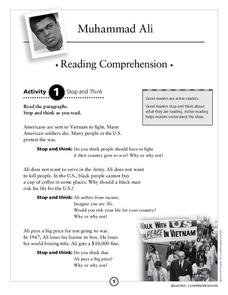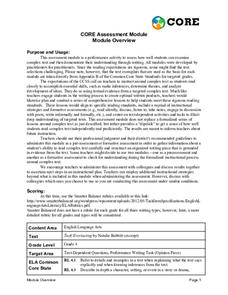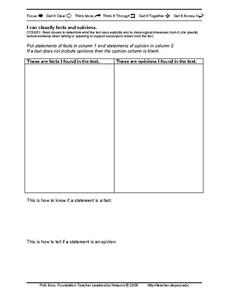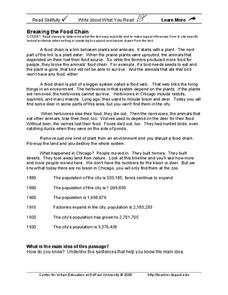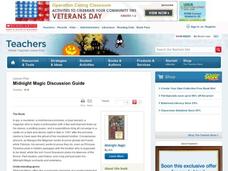K5 Learning
Liza's First Spelling Bee
Learners read about Liza's first spelling bee before answering six reading comprehension questions. Skills include identifying similarities, making inferences, drawing conclusions, and answer questions based on explicit information in...
Curriculum Corner
Riddle Cards
What better way to introduce making inferences than with riddle cards? Young readers practice making inferences through riddle cards and other types of reading, while filling out graphic organizers. The resource even comes with blank...
EngageNY
Learning About Farms in Colonial America: Explicit vs. Inferred Information
Aid your pupils in understanding the terms explicit and inferred while teaching them about colonial farmers. The third activity in the module builds off the previous activity and focuses heavily on inference. Learners analyze a...
Curated OER
Phineas Gage: “This I Believe” Venn Diagrams After Reading Strategy
Difficulties with brain injuries still continue today. After reading Phineas Gage: A Gruesome but True Story About Brain Science, class members read a series of modern personal essays about brain injuries and choose an essay to compare...
Library of Congress
Muhammad Ali
Muhammad Ali was the greatest, as he'd tell you himself. A set of reading comprehension worksheets walks through parts of Ali's life and promotes individuals to become good readers and writers.
August House
The Pig Who Went Home on Sunday
Turn your classroom into a pig sty with a instructional activity based on the Appalachian folktale The Pig Who Went Home on Sunday. Similar to the story of The Three Little Pigs, the folktale tells a story of four pigs who leave home—and...
Houghton Mifflin Harcourt
Practice Book: The Boy Who Saved Baseball
An array of reading comprehension, grammar, spelling, and vocabulary activities are at your fingertips with a language arts practice packet. Second, third, and fourth graders work on various skills using reading passages and word banks,...
Texas Education Agency (TEA)
Distinguishing Between Inductive and Deductive Reasoning (English III Reading)
Is Sherlock Holmes an inductivist or a deductivist? Users of this interactive to distinguish between inductive and deductive reasoning. They consider in various situations whether it is better to list evidence and then introduce a claim...
Texas Education Agency (TEA)
Annotate and Analyze a Paired Passage: Practice 1 (English II Reading)
What do a colt and a boy in a tree have in common? More than might be first apparent. The fourth interactive in a series of ten introduces readers to intertextuality, the process of using abstract thinking to consider how one text...
California Education Partners
Tuck Everlasting
An assessment takes a close look at the story, Tuck Everlasting by Natalie Babbitt, and tests writing abilities. Over the course of two days, scholars read an excerpt, answer questions on a worksheet pertaining to the author's purpose...
Harper Collins
Every Thing On It Lessons and Activities
Honor the great poet, Shel Silverstein with eighteen activities and lessons showcasing his collection of poems from the book, Every Thing On It. Activities challenge scholars to rhyme words, make inferences, recite a poem, and more!
Prestwick House
Vocabulary in Context: Wilderness Survival
Do you have what it takes to survive in the wilderness? A high-interest reading passage offers practical advice while incorporating vocabulary practice. Follow-up worksheets focus on skills such as defining words, making inferences, and...
Reed Novel Studies
Winnie-The-Pooh: Novel Study
Winnie the Pooh lands in a gorse-bush plant in chapter one of A.A. Milne's beloved children's novel, Winnie-the-Pooh. With the novel study, scholars research three interesting facts about the plant. They also compose a four-line poem...
Reed Novel Studies
A Single Shard: Novel Study
Fulfilling a dream requires a lot of hard work. A study guide for the novel A Single Shard shares the dream of a young Korean orphan. As readers work through the guide, they answer comprehension questions about Tree-ear and the other...
Polk Bros Foundation
I Can Sequence Important Events
After reading any short informational or fictional text, ask your class to analyze the important events. They note down three important events on a short timeline, describing the events with either words or drawings. After this, pupils...
Polk Bros Foundation
I Can Identify/Infer Motive
Why do people and characters act as they do? Require your class figure out the motivation of two people or characters they read about in a given text. In the short charts, pupils note down who, what they do, and why they do it. After...
Polk Bros Foundation
I Can Classify Facts and Opinions
Telling fact from opinion can be tricky. Direct your class to practice their reading and comprehension skills by taking notes on the facts and opinions in a text. Pupils fill out a two-column chart and write down how they know a...
DePaul University
Breaking the Food Chain
Throughout history, the growth of big cities has resulted in the destruction of ecosystems. In the case of Chicago, IL, a grassland that was once home to bison, deer, wolves, and foxes quickly became a booming city of over three million...
Polk Bros Foundation
I Can Locate and Classify Information About a Topic
After reading a text, ask your pupils to recall and organize what they've just learned into a blank three-column chart. Class members write the topic and fill in the columns with information. The sheet also prompts students to write a...
Scholastic
Midnight Magic Discussion Guide
This discussion guide accompanies the fiction book Midnight Magic written by Avi, enforces story elements, inferences, and theme/plot. Have the class work on it over time, it will engage even your reluctant readers.
Great Books Foundation
The Glass of Milk
It's not easy to ask for help. Learn why a boy on a ship struggles with accepting help in "The Glass of Milk," a short story by Manuel Rojas. Six discussion questions prompt class members to make inferences from the text about character...
California Education Partners
From Seed to Pumpkin by Wendy Pfeffer
Conduct a lesson that leads into a writing assessment. After reading an excerpt from From Seed to Pumpkin, first graders demonstrate their interpretation of sections of the passage by sketching the details from each part.
Reed Novel Studies
Peter and The Starcatchers: Novel Study
Peter and Molly, characters in Peter and the Starcatchers by Dave Barry and Ridly Pearson, are in a different world on a faraway island fighting pirates and thieves. As scholars read about the kids' adventures, they complete sentences...
Great Books Foundation
The Road Not Taken
Every time you make a choice, it prevents another option from taking shape. Spend some time analyzing "The Road Not Taken" by Robert Frost with a reading activity that includes four discussion questions that recall evidence from the text.






